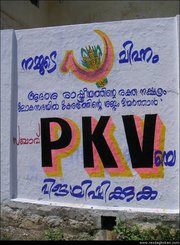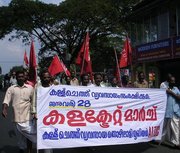Communist Party of India
|
|
Template:Infobox Indian Political Party The Communist Party of India (CPI) is a political party in India. In the Indian communist movement, there are different views on exactly when the Indian communist party was founded. The date maintained as the foundation day by CPI is 26 december 1925. But the Communist Party of India (Marxist), which split-off from the CPI, claims that the party was founded in the USSR in 1920.
| Contents |
Communism during the colonial period
Asf2003k.jpg

During the 1920s and beginning of 1930s the party was badly organized, and in practice there were several communist groups working with limited national coordination. The British colonial authorities had banned all communist activity, which made the task of building a united party very difficult. Only in 1935 was the party ready to be accepted as the Indian section of the Communist Third International.
In connection with the change of policy of the Comintern toward Popular Front politics, the Indian communists changed their relation to the Indian National Congress. The communists joined the Congress Socialist Party (CSP), the left wing of Congress. In Kerala communists won control over CSP, and for a brief period controlled Congress there.
During the Second World War, there were drastic changes for the Indian communists. After that the USSR had sided with Britain in the war, the Communist Party of India was legalized for the first time. Communists strengthened their control over the All India Trade Union Congress. At the same time, communists were politically cornered for their opposition to the Quit India Movement.
In 1946 the party launched the Tebhaga movement in Bengal, a militant campaign against feudalism.
Communists after Independence
During the period around and directly following Independence in 1947, the internal situation in the party was chaotic. The party shifted rapidly between left-wing and right-wing positions. In 1948, at the 4th Party Congress in Palghat, B.T. Ranadive (BTR) was elected General Secretary of the party. In several areas the party led armed struggles against a series of local monarchs that were reluctant to give up their power. Such insurgencies took place in Tripura, Telangana and Kerala. The most important rebellion took place in Telangana, against the Nizam of Hyderabad. The communists built up a people's army and militia and controlled an area with a population of three million. The rebellion was brutally crushed and the party abandoned the policy of armed struggle. BTR was deposed and denounced as a 'left adventurist'. In the general elections in 1957, the CPI emerged as the largest opposition party.
In 1957, the CPI won the state elections in Kerala. This was the first time that a opposition party won control over an Indian state. E. M. S. Namboodiripad became Chief Minister.
A serious rift within the party surfaced in 1962. One reason was the Sino-Indian War, where the Soviet faction of the Indian communists backed the position of the Indian government, while other sections of the party claimed that it was a conflict between a socialist and a capitalist state, and thus took a pro-Chinese position. Hundreds of CPI leaders, such as E. M. S. Namboodiripad and B.T. Ranadive, accused of being pro-Chinese were imprisoned. The internal split was sealed in 1964 when two different party conferences were held, one of CPI and one of the Communist Party of India (Marxist), and thus the party was split.
During the period 1970-77, CPI was allied with Congress. In Kerala, they formed government together with Congress, with the CPI-leader Achutha Menon as Chief Minister. After the fall of the regime of Indira Gandhi, CPI reoriented itself towards cooperation with CPI(M).
Present situation

Aitucernakulam.JPG
CPI is recognized by the Election Comminsion of India as a "National Party".
On the national level they support new Indian National Congress-led United Progressive Alliance government, but without taking part in it.
In West Bengal and Tripura it participates in Left Front-governments. It is also taking part in the state government in Manipur. In Kerala the party is part of Left Democratic Front. In Tamil Nadu it is part of the Progressive Democratic Alliance.
The current general secretary of CPI is A.B. Bardhan.
The principal mass organizations of the CPI are:
- All India Trade Union Congress
- All India Youth Federation
- All India Students Federation
- National Federation of Indian Women
- All India Kisan Sabha (peasants organization)
- Bharatiya Khet Mazdoor Union (agricultural workers)
Lok Sabha (House of the People) Election Results for the Communist Party
| State | No. of candidates 2004 | No. of elected 2004 | No. of candidates 1999 | No. of elected 1999 | Totalt no. of seats from the state |
| Andhra Pradesh | 1 | 1 | 6 | 0 | 42 |
| Arunachal Pradesh | 0 | 0 | 0 | 0 | 2 |
| Assam | 1 | 0 | 1 | 0 | 14 |
| Bihar | 6 | 0 | 9 | 0 | 40 (2004)/54(1999) |
| Chhattisgarh | 1 | 0 | - | - | 11 (2004) |
| Goa | 2 | 0 | 2 | 0 | 2 |
| Gujarat | 0 | 0 | 1 | 0 | 26 |
| Haryana | 0 | 0 | 0 | 0 | 10 |
| Himachal Pradesh | 0 | 0 | 1 | 0 | 4 |
| Jammu and Kashmir | 0 | 0 | 0 | 0 | 6 |
| Jharkhand | 1 | 1 | - | - | 14 (2004) |
| Karnataka | 0 | 0 | 0 | 0 | 28 |
| Kerala | 4 | 3 | 4 | 0 | 20 |
| Madhya Pradesh | 2 | 0 | 1 | 0 | 29 (2004)/40(1999) |
| Maharashtra | 1 | 0 | 2 | 0 | 48 |
| Manipur | 1 | 0 | 1 | 0 | 2 |
| Meghalaya | 0 | 0 | 2 | 0 | 2 |
| Mizoram | 0 | 0 | 0 | 0 | 1 |
| Nagaland | 0 | 0 | 0 | 0 | 1 |
| Orissa | 0 | 0 | 3 | 0 | 21 |
| Punjab | 1 | 0 | 1 | 1 | 13 |
| Rajasthan | 2 | 0 | 4 | 0 | 25 |
| Sikkim | 0 | 0 | 0 | 0 | 1 |
| Tamil Nadu | 2 | 2 | 2 | 0 | 39 |
| Tripura | 0 | 0 | 0 | 0 | 2 |
| Uttar Pradesh | 6 | 0 | 11 | 0 | 80 (2004)/85 (1999) |
| Uttaranchal | 0 | 0 | - | - | 5 (2004) |
| West Bengal | 3 | 3 | 3 | 3 | 42 |
| Union Territories | |||||
| Andaman & Nicobar | 0 | 0 | 0 | 0 | 1 |
| Chandigarh | 0 | 0 | 0 | 0 | 1 |
| Dadra and Nagar Haveli | 0 | 0 | 0 | 0 | 1 |
| Daman and Diu | 0 | 0 | 0 | 0 | 1 |
| Delhi | 0 | 0 | 0 | 0 | 7 |
| Lakshadweep | 0 | 0 | 0 | 0 | 1 |
| Pondicherry | 0 | 0 | 0 | 0 | 1 |
| Total: | 34 | 10 | 54 | 4 | 543 |
State Election Results For the Communist Party of India
| State | No. of candidates | No. of elected | Total no. of seats in Assembly | Year of Election |
| Andhra Pradesh | 12 | 6 | 294 | 2004 |
| Assam | 19 | 0 | 126 | 2001 |
| Bihar | 153 | 5 | 324 | 2000 |
| Chhattisgarh | 18 | 0 | 90 | 2003 |
| Delhi | 2 | 0 | 70 | 2003 |
| Goa | 3 | 0 | 40 | 2002 |
| Gujarat | 1 | 0 | 181 | 2002 |
| Haryana | 10 | 0 | 90 | 2000 |
| Himachal Pradesh | 7 | 0 | 68 | 2003 |
| Jammu and Kashmir | 5 | 0 | 87 | 2002 |
| Karnataka | 5 | 0 | 224 | 2004 |
| Kerala | 22 | 7 | 140 | 2001 |
| Madhya Pradesh | 17 | 0 | 230 | 2003 |
| Maharashtra | 19 | 0 | 288 | 1999 |
| Manipur | 16 | 5 | 60 | 2002 |
| Meghalaya | 3 | 0 | 60 | 2003 |
| Mizoram | 4 | 0 | 40 | 2003 |
| Orissa | 6 | 1 | 147 | 2004 |
| Pondicherry | 2 | 0 | 30 | 2001 |
| Punjab | 11 | 2 | 117 | 2002 |
| Rajasthan | 15 | 0 | 200 | 2003 |
| Tamil Nadu | 8 | 5 | 234 | 2001 |
| Tripura | 2 | 1 | 60 | 2003 |
| Uttar Pradesh | 5 | 0 | 402 | 2002 |
| Uttaranchal | 14 | 0 | 70 | 2002 |
| West Bengal | 13 | 7 | 294 | 2001 |
Results from the Election Commission of India website. Results do not deal with partitions of states (Bihar was bifurcated after the 2000 election, creating Jharkhand), defections and by-elections during the mandate period.
See also: List of political parties in India, Politics of India, List of Communist Parties
External links
- Communist Party of India web site (http://www.cpofindia.org/)
- Assorted CPI-related images (http://img78.photobucket.com/albums/v297/inquilab/India/CPI/)ja:インド右派共産党
